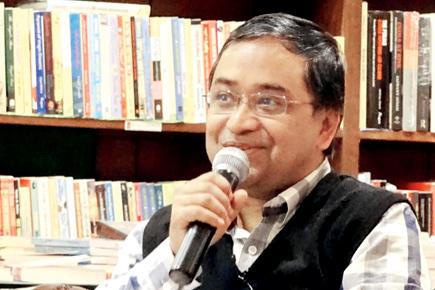Author Nilanjan Choudhury’s second book, The Case Of The Secretive Sister, hopes to breathe a new life into the mystery-humour genre. He speaks to Kareena Gianani about moving on from mythology, and why this book is an ode to Bangalore

Author Nilanjan Choudhury
Before I could ask Nilanjan Choudhury what prompted him, a former software professional educated at IIT Kanpur and IIM Ahmedabad, to write humour, he says, “Don’t hold my corporate job against me!”
ADVERTISEMENT

Author Nilanjan Choudhury. Pic courtesy/ Vishnu Ratheesh
He chuckles on the other side of the telephone, from Bengaluru, and I promise to do my best.
“The degrees are only one part — a small part — of me,” he admits. Reading, he adds, before much else. As a boy growing up in Shillong in the ‘70s, Choudhury grew up without television being at his beck and call. “I grew up on Sherlock Holmes, PG Wodehouse, and John Mortimer’s detective character, Rumpole, and came to love the mix of humour and mystery,” he says.
That, and Choudhury’s own experience when he was trying to get his daughter admitted to school, prompted him to begin writing his recently-written novel, The Case of The Secretive Sister, published by Niyogi Books. “My daughter will be mortified that I am saying this, but she was having trouble with school admissions because she was shy and didn’t pass through the hoops thrown her way.
Finally, one of the schools, we learnt, admitted students on a first-come-first-serve basis, and had 75 seats. Could you guess when parents began queuing up before the gates opened one Monday?
The Wednesday before!” he chuckles.
That, he adds, got him thinking about how the seemingly-trivial issues that people face actually feel like the world to them, and, of course, serve themselves on a platter for a satire junkie. He began writing about the book’s protagonist, Detective Chatterjee, who must get into the mind of a much-feared, capricious school principal to help his client’s child get admission. Events, however, take unexpected turns and the detective must tie them all up in the end.
Choudhury’s last book, Bali and the Churning Of Milk, also his debut novel, was a mythological thriller. He, however, was never tempted to churn out a mythological series like his peers. “I cannot write with on eye on the market. I’d love to create one, though,” he says after some thought.
For all you know, Choudhury’s new book might just do that — the book, he says, is inspired by Alexander McCall Smith’s endearing Motswana character Mma Ramotswe of the Ladies No. 1 Detective Agency series (Mr Chatterjee gets by with bad coffee made by his assistant instead of Mma’s excellent bush tea). “I didn’t want to plot this one too much. I wanted to do what a paleontologist does — brush a site lightly, and let the story emerge,” he says.
What the author did plan, though, was to essay the Bengaluru he has known intimately since 12 years. “This is my love letter to the city. I wondered what the old-timers of this city, who saw it as the idyllic place it once was, feel about migrants like me — non-Kannada speaking, disappearing into their boxed apartments at the end of the day…,” says Choudhury.
Choudhury says the best feedback on the book is in the form of the cover, designed by Paul Fernandes, one of the finest chroniclers of Bengaluru. “Some might feel I have stereotyped communities — the Punjabi wife, the Bengali detective — but I’ll take that risk. I hope to have brought out the flavour of this melting pot of a city through the communities before giving them singular shades.” elaborates Choudhury.
 Subscribe today by clicking the link and stay updated with the latest news!" Click here!
Subscribe today by clicking the link and stay updated with the latest news!" Click here!







